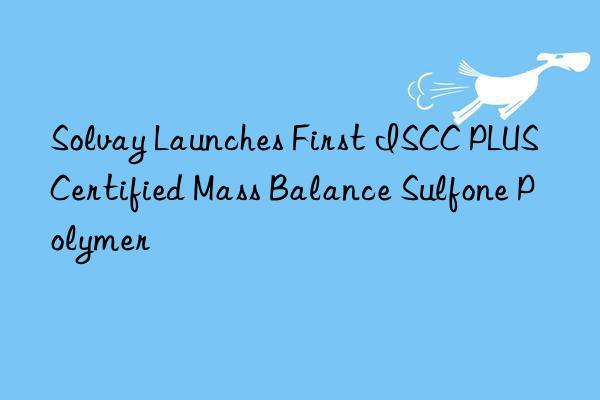
Solvay, the world's leading supplier of special materials, successfully obtained international sustainable development and carbon certification for its polysulfone (PSU) and polyphenylsulfone (PPSU) production base in Marietta, Ohio, USA Independent third-party mass balance (MB) [1] chain of custody certification for the system (ISCC-PLUS). Its products Udel® PSU ReCycle MB and Radel® PPSU ReCycle MB is the first sulfone material on the market that meets the requirements of the ISCC-PLUS mass balance standard and has been launched worldwide.
Bianca, Global Sustainable Sourcing Manager, Solvay Materials Division Dr Shemper said: "This is an important achievement as we work to drive our industry's transition to a more circular economy by replacing fossil resources with sustainably and responsibly sourced alternatives. On the one hand, it fits" Solvay’s One Planet Roadmap to mitigate the environmental impact of our operations and reduce Scope 1, 2 and 3 emissions [2], another On the one hand, it also provides a reliable way for our customers to contribute to the circular economy while minimizing their Scope 3 emissions to meet tough sustainability and decarbonization targets.”
Solvay's mass-balanced sulfones portfolio is based on monomers produced at the company's Augusta, Georgia, USA facility, which has been ISCC certified in 2022 PLUS certification. Global supply of cyclic sulfone polymers is secured by a major investment project in Marietta that will allow Solvay to boost total PSU capacity by 25% by 2024 alone.
To produce the new ISCC-PLUS certified product portfolio, Solvay has adopted a mass balance method to assess, track and allocate the quantity of fossil-derived resources replaced by certified circular raw materials. The carbon footprint of certified products can be significantly reduced compared to traditional fossil-based materials. [3]
Due to their bioinertness, Solvay's Radel® PPSU compounds are used in a wide range of medical, food and plumbing applications, aiming to replace metals for weight reduction and corrosion resistance. Udel® Characterized by low levels of extractables and solubles, PSU resins are the material of choice in areas such as water treatment, healthcare and bioprocessing, including filtration membranes and kidney dialysis components.
Claire, Global Marketing Manager, Solvay Sustainability Division Guerrero added: "The commercialization of mass-balanced sulfones is another step forward as we continue to pioneer and revolutionize the market for high-performance materials through responsible sourcing and production. In addition, we will launch a series of other Certified circular polymers, including Ryton® polyphenylene sulfide and Amodel® polyphthalamide.”
Udel®, Radel®, Ryton® and Amodel® are registered trademarks of Solvay Corporation.
[1] Made from renewable and/or recycled materials using mass balance (MB) accounting methods. Based on ISCC The mass balance concept of the PLUS principles has become a globally accepted industry standard, providing a set of clear rules for tracking and tracing the sustainable content of circular/renewable raw materials in materials and final products. This way, based on Solvay's life cycle assessment calculations, users of certified materials can claim a reduced carbon footprint of their formulations, and brands can demonstrate their increased sustainability to consumers.
[2] Within the framework of the Greenhouse Gas Emissions Accounting System (GHGP), scope 1 refers to direct emissions caused by the company's internal production processes, scope 2 refers to indirect emissions caused by the company's energy procurement, and scope 3 refers to material supply, packaging and transportation All other indirect emissions from upstream and downstream sources.
[3] Solvay assesses the carbon footprint of products through Life Cycle Assessment (LCA) according to current standards.



 微信扫一扫打赏
微信扫一扫打赏
